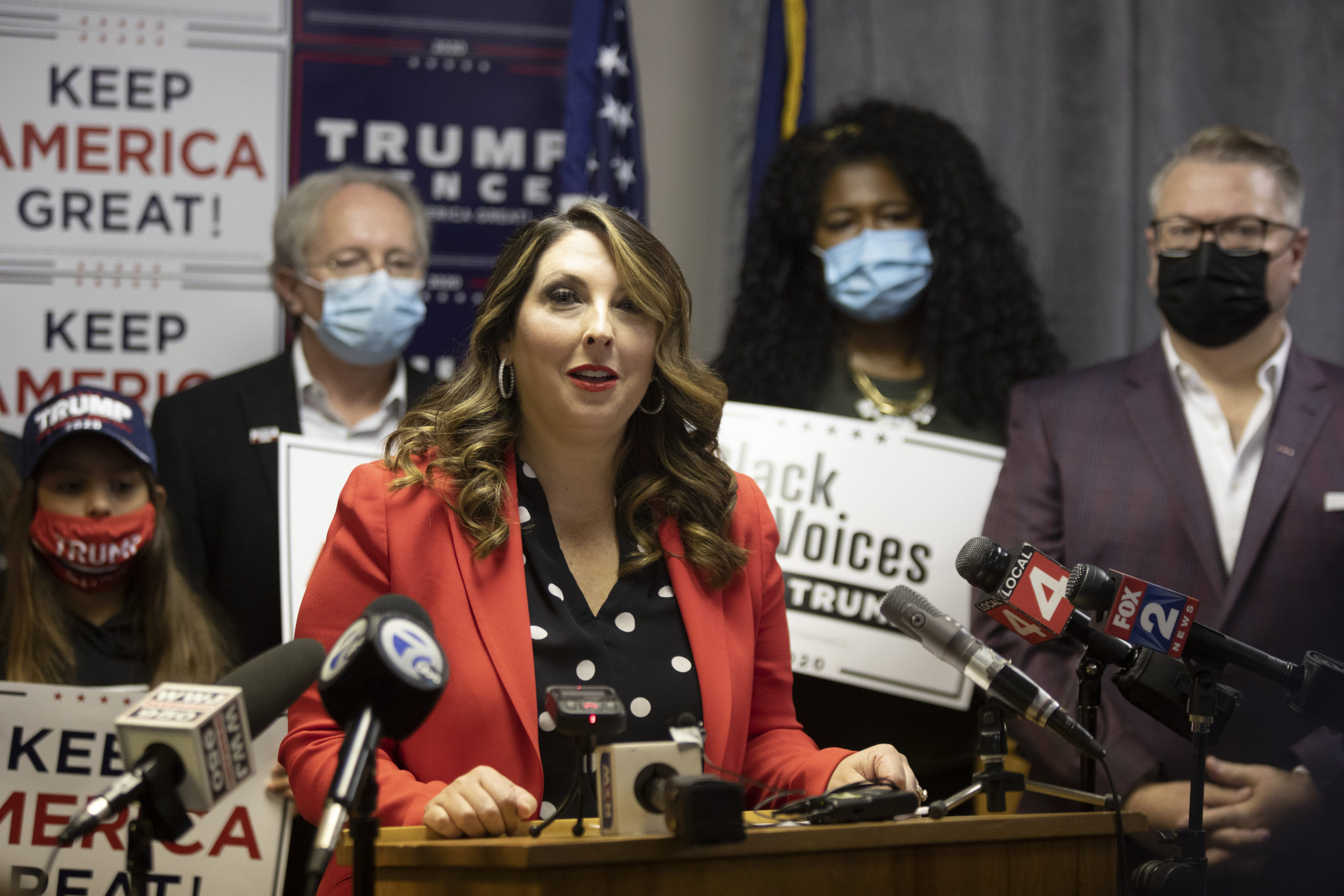The Republican National Committee (RNC) and Politico went to war after Politico’s chief political correspondent published a piece accusing chairwoman Ronna McDaniel and other Republicans of knowingly allowing President Donald Trump to lie – without reaching out for comment.
Politico’s chief political correspondent Tim Alberta published a piece on Nov. 24 titled: “The Inside Story of Michigan’s Fake Voter Fraud Scandal.” The article dove into Trump’s allegations of voter fraud in Michigan and called out Republicans who “knew it was a lie” but “didn’t lift a finger in protest as the president … and subverted America’s democratic norms.”
In the piece, Alberta wondered “why” these Republicans allegedly acted in this way and accused McDaniel of making decisions based on needing to keep her position – but apparently failed to contact the chairwoman and the RNC to get their comment.
The RNC’s Communications Director Michael Ahrens emailed Alberta wondering about the “editorial leeway” in not reaching out following publication, according to Eric Wemple, The Washington Post’s media critic. (RELATED: Republican National Committee Chairwoman Ronna McDaniel Calls For Michigan To Delay Certification Of Its Election Results)
“Is there a lot more editorial leeway granted with magazine pieces that allows you to write at length about someone and not reach out to them at all before publishing? Haven’t run into this before with Politico, or many other mainstream outlets to be honest, but wanted to check,” Ahrens wrote.
RNC blasts Politico over Michigan election story. @ErikWemple has the latest: https://t.co/9r8jj3iuBg
— Washington Post Opinions (@PostOpinions) December 2, 2020
Alberta’s decision not to reach out to the individuals he wrote about prompted a sort of war with RNC, Wemple’s report indicates. Alberta responded to Ahrens by accusing McDaniel and the RNC of being “so dishonest and so untrustworthy” that he felt “no obligation to provide them a platform” to lie.
“To answer your question: Our editorial standards are fairly uniform across mediums/verticals. 99.9% of the time, I will request comment from a principal or organization I’m writing about,” Alberta replied according to Wemple. “However, there are extremely rare instances when the person/entity has proven so dishonest and so untrustworthy that I feel no obligation to provide them a platform from which to deceive the public. Sadly, that is the case with Chairwoman McDaniel and her staff at the RNC.”
Alberta continued on to write that he would “be happy to review” any comment from McDaniel responding to the article. Following this, Ahrens wrote to various Politico reporters and made them aware of the publication’s “new editorial standards with regards to the RNC, the chair, and all of our staff,” Wemple reported.
“My understanding is that these would now apply to your coverage, as well,” Ahrens quipped.
Eventually, Politico’s editor-in-chief Matt Kaminski became involved. He backed up Alberta’s story and wrote that it “is based on deep reporting.” Kaminski refused to “get into” Politico’s editorial decisions and suggested Ahrens “dispense with this nonsense about our ‘changing standards.'”
“Tim’s magazine story is based on deep reporting on both sides of the aisle in Michigan the past few weeks and draws on years of reporting on the GOP and of course Michigan too,” Kaminski wrote according to Wemple. “His relationship with Ronna McDaniel goes back most of the past decade. Tim’s credibility on this piece and in general is beyond question.”
“I won’t get into our editorial processes with you or anyone else except to say that we stand by every word of the piece,” he continued, adding that Politico would allow them to respond to the piece or submit an op-ed replying to it. “Let’s also dispense with this nonsense about our ‘changing standards.’ I’ll give you the benefit of the doubt and assume you know the answer.”

Republican National Committee Chairwoman Ronna McDaniel speaks during the Trump Victory press conference on November 6, 2020 in Bloomfield Hills, Michigan. (Elaine Cromie/Getty Images)
Despite the piece mentioning McDaniel 18 times, as Wemple reported, Politico spokesman Brad Dayspring defended the editorial decision in a statement to the Daily Caller. (RELATED: Politico Quietly Updates Article After Claiming Trump Currently ‘Owes’ Millions To Bank Of China)
“The Inside Story of Michigan’s Fake Voter Fraud Scandal is a deeply sourced article that not only makes clear the position of the national GOP, but reflects the views of a number Republicans close to the RNC whom Tim spoke with in reporting out the story,” Dayspring said in the statement.
“The Republican National Committee was offered an opportunity to reply to the story or to submit an op/ed from Chairwoman McDaniel on this or any other topic. The email exchange leaked by the RNC speaks for itself, but POLITICO stands by the story and encourages people to read it for themselves and form their own opinion,” Dayspring continued.
McDaniel and the RNC are not the only ones that Alberta failed to contact, according to Wemple. Executive director of the Michigan Republican Party Michael Ambrosini said he “never” received a request for comment from his group regarding the story, either, WaPo wrote.
“Whether you agree with who you are covering or not, the basic standards of journalism should still apply,” Athrens wrote in a statement to Wemple. “I have never heard of a news organization taking the position that they are ‘beyond question’ and therefore do not need to reach out to the people they cover. Not that it should matter, but Chairwoman McDaniel has no relationship with this reporter either, much less one that spans a decade.”


